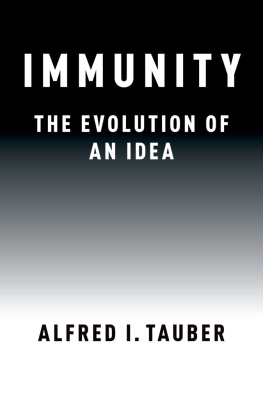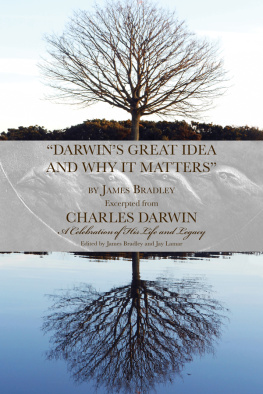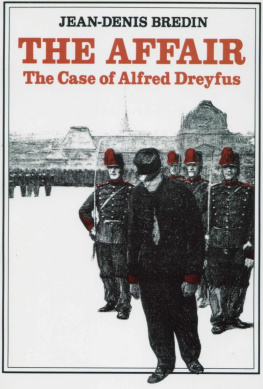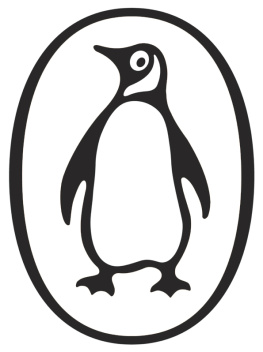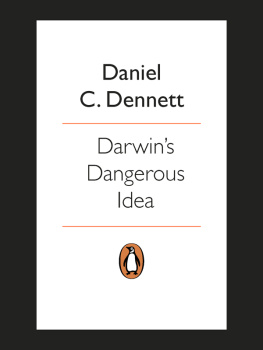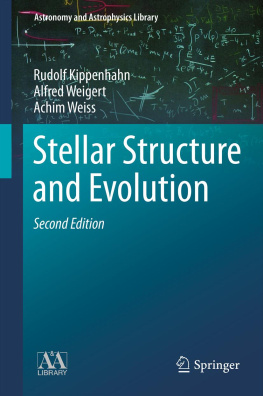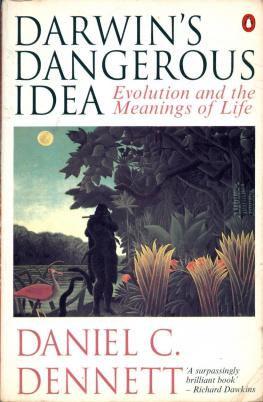Alfred I . Tauber - Immunity: The Evolution of an Idea
Here you can read online Alfred I . Tauber - Immunity: The Evolution of an Idea full text of the book (entire story) in english for free. Download pdf and epub, get meaning, cover and reviews about this ebook. year: 2016, publisher: Oxford University Press, genre: Romance novel. Description of the work, (preface) as well as reviews are available. Best literature library LitArk.com created for fans of good reading and offers a wide selection of genres:
Romance novel
Science fiction
Adventure
Detective
Science
History
Home and family
Prose
Art
Politics
Computer
Non-fiction
Religion
Business
Children
Humor
Choose a favorite category and find really read worthwhile books. Enjoy immersion in the world of imagination, feel the emotions of the characters or learn something new for yourself, make an fascinating discovery.
- Book:Immunity: The Evolution of an Idea
- Author:
- Publisher:Oxford University Press
- Genre:
- Year:2016
- Rating:3 / 5
- Favourites:Add to favourites
- Your mark:
- 60
- 1
- 2
- 3
- 4
- 5
Immunity: The Evolution of an Idea: summary, description and annotation
We offer to read an annotation, description, summary or preface (depends on what the author of the book "Immunity: The Evolution of an Idea" wrote himself). If you haven't found the necessary information about the book — write in the comments, we will try to find it.
Immunity: The Evolution of an Idea — read online for free the complete book (whole text) full work
Below is the text of the book, divided by pages. System saving the place of the last page read, allows you to conveniently read the book "Immunity: The Evolution of an Idea" online for free, without having to search again every time where you left off. Put a bookmark, and you can go to the page where you finished reading at any time.
Font size:
Interval:
Bookmark:


Oxford University Press is a department of the University of Oxford. It furthers the Universitys objective of excellence in research, scholarship, and education by publishing worldwide. Oxford is a registered trade mark of Oxford University Press in the UK and certain other countries.
Published in the United States of America by Oxford University Press
198 Madison Avenue, New York, NY 10016, United States of America.
Oxford University Press 2017
All rights reserved. No part of this publication may be reproduced, stored in a retrieval system, or transmitted, in any form or by any means, without the prior permission in writing of Oxford University Press, or as expressly permitted by law, by license, or under terms agreed with the appropriate reproduction rights organization. Inquiries concerning reproduction outside the scope of the above should be sent to the Rights Department, Oxford University Press, at the address above.
You must not circulate this work in any other form and you must impose this same condition on any acquirer.
Library of Congress Cataloging-in-Publication Data
Names: Tauber, Alfred I.
Title: Immunity : the evolution of an idea / Alfred I. Tauber.
Description: New York, NY : Oxford University Press, 2017.
Identifiers: LCCN 2016024105 | ISBN 9780190651244 (hardback : acid-free paper) | ISBN 9780190651268 (ebook) | ISBN 9780190651275 (online resource)
Subjects: LCSH: ImmunologyPhilosophy. | BISAC: SCIENCE / Philosophy & Social Aspects. | MEDICAL / Immunology.
Classification: LCC QR181 .T37 2017 | DDC 616.07/9dc23 LC record available at https://lccn.loc.gov/2016024105
In memory of Lynn Margulis
Immunology has always seemed to me more a problem in philosophy than a practical science.
, p. 17)
In its historical development, the conceptualization of the immune self has always suffered an ontological obsession.
, p. 1)
Our imperative need for cause and effect is satisfied when each process has one demonstrable cause. In reality, outside us this is hardly so; each event seems to be over-determined and turns out to be the effect of several converging causes. Intimidated by the countless complications of events research takes the part of one chain of events against another, stipulates contrasts that do not exist and that are created merely through tearing apart more comprehensive relations. I do not mean to say that the world is so complicated that every assertion must hit the truth somewhere. No, our thinking has preserved the liberty of inventing dependencies and connections that have no equivalent in reality. It obviously prizes this gift very highly, since it makes such ample use of itinside as well as outside of science.
Freud (, p. 137)
This book is about how ideas structure and orient the practice and theory of a science. Such foundational ideas for the most part remain hidden, or at least implicit to the immediate goals of research. Indeed, the most evident task of science is a practical enterprise; nevertheless, the tacit dimension of intellectual (and often ideological) commitments is always at play, guiding interpretations of data and the assembling of facts into models and then theory. So, although Frank Macfarlane Burnet used a bit of hyperbole when observing that immunology was more a problem in philosophy than a practical science (, p. 17), I fully concur with his basic insight: Much of immunology fascinates because of its intellectual challenges, the vibrancy of its key ideas, and the scope of philosophical issues the study of immunology might address.
Immunology, from its earliest inception, has been concerned with biological identityits establishment and maintenance. Three key characteristicsindividuality, immunity, and identificationtogether define immune identity, and as one notion changes meaning, so do the others. Individuality framed immune theory from its inception, for the attack of pathogens on a vulnerable patient (individual) defined the task of immunity, namely to defend a self pitted against alien others. In this scenario, distinct borders confer guarded individuality, and immunity is the response to the violation of those boundaries. Simply, the individual is self-contained. Contemporary immunology now recognizes the fluidity of borders in the dialectical exchange of the organism with its environment, where the beneficial is absorbed through the active tolerance of the immune system. So beyond a defense of an insular individual, the ecological context of the organism has changed the definition of individuality and the processes responsible for such differentiation. Moreover, the concept of the organism as a holobiont, characterized by multiple species living together in complex immune relationships, has further deconstructed older versions of biological individuality. Add the growing appreciation of the prevalence of symbiosis and the concept of an individual has radically been altered.
In response to this ecologically informed conception of the individual, the idea of immunity correspondingly widens. Accommodating the relaxed criteria of self and other requires appreciation of how the immune system permits beneficial exchanges to occur. The shift from the almost exclusive focus on aggressive immune responses to the study of the balance of reactivities on an immune activation gradient has altered the basic notions of what immunity is. Instead of immunity regarded exclusively as a defensive state, it becomes an ongoing process of establishing and maintaining organismal identityprocesses that require a group of physiological activities with protean functions. This reassessment includes the normal housekeeping sentinel activities that monitor the host organism, where, again, the self/other distinction is replaced with a spectrum of immune responses along a functional gradient.
Finally, in conceptually reconfiguring immunity, the immune systems identification processes are understood as determined not by recognition of toxicity per se but, rather, by the context of the encounter in which the potential danger is recognized. The classification of friend or foe is determined by multiple factors that together create the setting for the immune response. Thus, in terms of understanding the nature of the immunity, this contextual orientation has displaced the earlier understanding of immune specificity as arising from some simple mechanical lock and key matching between selected antibodies binding to simple antigens to one characterized by a collective response of diverse elements that together determine the extent of the immune response. Here, two corollaries follow. First, a simple cue ball mechanical model (a linear stimulus sequence) cannot capture the dynamic modes of causation that characterize immune functions, and from this understanding, a simple self/nonself discriminatory schema fails to account for immunity. So on this view, immune identity is dynamic, and thus the notion of the immune self (an entity that lacks singular definitional criteria, in any case) fails to ground immune theory. Another account is required, and here an outline of such a revision is offered.
Amending immunologys governing precepts along these lines poses philosophical evaluation of five major questions, each of which refracts the underlying challenge of defining biological identity: (1) What is immunity? (2) What are the defining characteristics of individuality as determined by immunity? (3) What are the epistemological standing of immune selfhood and the rhetorical uses of agency in its various forms (literal, metaphoric, and idiomatic)? (4) How has the cognitive metaphor framed immune processes as an information processing system? and (5) How to model biological causation of the immune system studied as a whole? Each of these issues directly pertains to philosophical considerations about the character of the organism, the relationships of parts to the whole, principles of biological organization and regulation, and the ability of models to capture complex organic functions. The literature pertinent to addressing these issues is legion, but in regard to the study of immunology, relatively little direct philosophical comment has been made. Plainly, immunology is a rich philosophical mine yet to be explored.
Font size:
Interval:
Bookmark:
Similar books «Immunity: The Evolution of an Idea»
Look at similar books to Immunity: The Evolution of an Idea. We have selected literature similar in name and meaning in the hope of providing readers with more options to find new, interesting, not yet read works.
Discussion, reviews of the book Immunity: The Evolution of an Idea and just readers' own opinions. Leave your comments, write what you think about the work, its meaning or the main characters. Specify what exactly you liked and what you didn't like, and why you think so.

